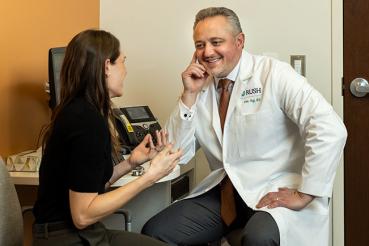You went out in the freezing cold with wet hair. Now you're bound to catch a cold, right? Wrong. Despite its name — and, perhaps, your Mom's warnings — a cold has nothing to do with the temperature.
All colds are caused by viruses. There are roughly 200 types of cold-causing viruses. The most prevalent is rhinovirus, an infectious agent that lives in the nose and throat, accounting for nearly 30 to 50 percent of all colds.
So why do people catch more colds in the winter? Because we spend more time indoors near other people — and their viruses — says Kelly Stein, MD, an internist at Rush.
Here, Stein explained more about this all-too-frequent illness.
The cold cycle
Most of us have experienced a cold "going around," when co-workers, friends or family members are sick at the same time.
That's because cold viruses transmit readily from person to person. Let's say you have a cold and you touch your nose. The virus is then on your hands, and you can pass it to any person or surface you touch.
You can also spread the virus around simply by sneezing. This "ease of passage" is why cold viruses can affect so many people at once. Plus, unlike a more serious virus, a cold may not make people terribly sick and, in turn, they are more likely to go out and infect others.
When colds are contagious
Cold symptoms appear within 24 to 48 hours after you are infected, and the virus can hang on for five to 14 days.
You may be infectious for seven to 14 days after a cold starts, but the peak time when you can infect others is day two or three.
Vitamin C as a cold deterrent.
While it's true that vitamin C helps the immune system work properly to safeguard against disease, research has shown that for most people, taking vitamin C supplements doesn't actually reduce their risk of getting a cold.
There does, however, seem to be some evidence that if you're already taking vitamin C and you get a cold, you may have a slightly shorter cold. But once those cold symptoms appear, studies have shown that taking vitamin C tablets won't help.
What you can do to keep from catching a cold.
The best way to avoid colds — and exposing others to your cold — is by thoroughly washing your hands, and by covering your nose and mouth when you sneeze or cough. Just make sure to wash your hands if you cough or sneeze into them.
Good hand hygiene can help prevent the spread not only of colds, but of the flu as well. I tell people to follow these hand-washing recommendations from the Centers for Disease Control.
It's also a good idea to keep alcohol gels or wipes handy during peak cold and flu season (November through April) for those times when you can't get to a sink.
Good hand hygiene can help prevent the spread not only of colds, but of the flu as well.
When to see a doctor for a cold.
Most of the time, you don't need to see your doctor for a cold. Keep in mind that antibiotics won't cure a cold because they're for bacterial infections, and colds are viral. And one reason many people with colds see a doctor is because they think antibiotics will help.
The normal range of cold symptoms includes a stuffy head, runny nose and cough. If, however, you have symptoms that fall outside this range, you should contact your doctor right away. This could be any of the following:
- A fever higher than 101 degrees that lasts more than a day or two
- Significant facial pain with nasal discharge and a fever
- Serious head or body aches
It's also important to note that many colds last for one to two weeks, and a cough can persist for several weeks. Many patients go to the doctor's office after five to seven days because their symptoms haven't gone away, but this is still in the normal range for a cold virus.




